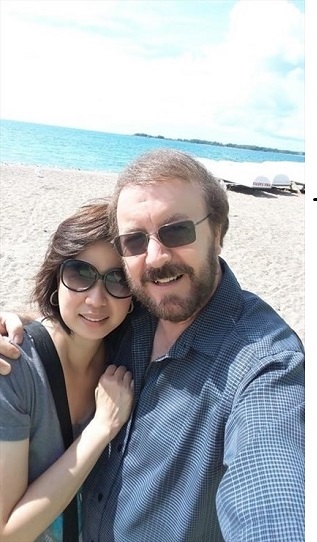Surgeons in Toronto have successfully completed the first double lung transplant in Canada for a person whose lungs were devastated by COVID-19.
The recipient, who had no prior comorbidities that put him at higher risk for infection or severe disease, is well aware of what a lucky man he is.
“People don’t realize what COVID does to people … and sometimes they’re putting their guard down,” Timothy Sauvé, 61, told Melissa Couto Zuber of The Canadian Press in a story published today.
Sauvé became ill with COVID-19 in December when he noticed himself getting dizzy at his Mississauga, Ont. home.
He soon developed a fever, experienced breathlessness in his sleep and had to be rushed to hospital.
Physically fit before he contracted the virus, Sauvé spent two months in intensive care units at two Toronto-area hospitals as his condition deterioriated.

Timothy Sauvé and his partner, Julie Garcia, pose for a selfie on Toronto’s Centre Island in a Sept. 7, 2018, handout photo. Sauvé, a 61-year-old from Mississauga, Ont., was rushed to hospital with a deteriorating condition that eventually required a double-lung transplant –believed to be the first done in Canada on a patient whose lungs were irreparably damaged by COVID-19. (THE CANADIAN PRESS/HO-Timothy Sauvé)
“Things were pretty bleak,” Sauvé told CP’s Zuber in a phone interview from the University Health Network’s Toronto Rehab Bickle Centre.
“They told me my (lungs) weren’t getting better and for me to make arrangements to say goodbye to my loved ones.”
It was then that Sauvé’s luck took a turn for the better.
After consulting with his family and doctors, he was transferred from Trillium Health Partners in Mississauga to UHN’s Toronto General Hospital, home to Canada’s largest organ transplant program.
Sauvé, it turned out, had caught a couple of breaks.
First: He had also cleared his COVID infection by the time he was assessed for a transplant, which was a main prerequisite before he could undergo surgery.
Second: While his lungs were scarred beyond repair, the virus hadn’t damaged any of his other organs, making him a candidate for the rare procedure that saved his life.
A careful assessment at the Ajmera Transplant Centre determined he was physically strong enough to undergo a transplant in February.
Dr. Marcelo Cypel, a thoracic surgeon at the University Health Network who led the team performing the operation, told Zuber that Sauve was on “very high amounts of oxygen” when he met him, and scans of his lungs showed heavy amounts of scar tissue called pulmonary fibrosis.
Cypel said Sauvé’s lungs had shrunk during his infection, becoming stiff and resistant to air flow.
“Lungs should be very light, like balloons — you can push air in very easily,” Cypel said.
“(Sauvé’s) were very similar actually to patients with chronic lung disease,” Cybel said, adding that he does not expect the procedure to be used frequently for severe COVID cases.

Dr. Marcelo Cypel, the surgical director for the University Health Network’s extracorporeal life support program in Toronto, which handles extracorporeal membrane oxygenation (ECMO) treatments, led the team performing Sauvé’s operation. (Submitted by University Health Network)
Even though only a very “small subset” of people would qualify, “it is a very powerful, life-saving therapy for some specific patients,” Cybel said, a procedure that’s been done about “40 or 50′ times worldwide.
Dr. Shaf Keshavjee, surgeon-in-chief at University Health Network and director of the Toronto Lung Transplant Program, said it’s a watch and wait situation.
“We had a meeting with the other transplant centres in Canada, and they’re sort of looking and waiting, watching what to do…knowing that they’re very difficult and high-risk transplants to do,” Keshavjee told CTV’s Avis Favaro.
Unversity Health Network, Zuber reports, is currently evaluating three additional COVID patients for candidacy.
So far, Sauvé told Zuber, his recovery is going fine, but the past few months have been an emotional nightmare for his family.
His entire household, including his common-law partner, Julie Garcia, her 24-year-old son and her father, 80-year-old Juanito Teng, all tested positive for COVID around the same time Sauve became ill.
Teng died in the ICU shortly after being admitted to hospital, in a room right next to Sauve’s and the family doesn’t know how members became infected or who got the virus first, Zuber reports.
Recovery times vary for patients after transplants, so Sauve isn’t sure how long he’ll need to stay at the rehab centre.
He will not be rushing things.
“I want to leave here on my own two feet,” he said. “I want to go home to my beautiful partner, Julie, but I don’t want to need a walker. I’ll stay here a little longer if I have to — it may take two months, three months, but my goal is to get back home.”
With files from The Canadian Press (Melissa Couto Zuber)







For reasons beyond our control, and for an undetermined period of time, our comment section is now closed. However, our social networks remain open to your contributions.